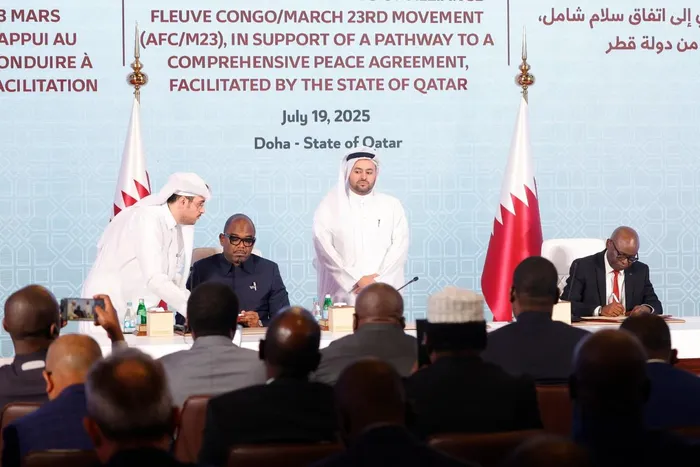Qatar Brokered DRC Peace Deal a Bittersweet Moment for Africa

Qatar's chief negotiator Mohammed al-Khulaifi (centre) observes peace mediator Sumbu Sita Mambu, a high representative of the head of state in the Democratic Republic of Congo (left) and Rwanda-backed armed group M23 executive secretary Benjamin Mbonimp (right as they sign a ceasefire deal in Doha on July 19, 2025.
Image: AFP
Dr. Sizo Nkala
The government of the Democratic Republic of Congo (DRC) and the rebel group, M23, signed a Declaration of Principles in Support of a Pathway to a Comprehensive Peace Agreement on the 19th of July under the mediation of Qatar.
The DRC government forces and the M23 have been locked in an armed conflict in eastern DRC since 2021. The conflict intensified at the beginning of 2025, which saw the M23 rebels, allegedly supported by Rwanda, go on the offensive and seize huge swathes of territory, including the major cities of Goma and Bukavu, the capitals of North and South Kivu provinces, respectively, including two major airports.
About 7000 people have reportedly lost their lives, and over a million more have suffered displacement as a result of the escalation. The latest agreement is a major step towards the resolution of a conflict that has defied continental and regional diplomatic and military intervention.
The DRC President, Felix Tshisekedi, had vowed never to meet with the M23 leaders. Both the Luanda and Nairobi processes failed to bring the two parties under one roof for negotiations.
According to the agreement, the two parties agreed to commit to a permanent ceasefire that will see the cessation of attacks, curbing of hate propaganda, and a freeze on seizing new territories. A verification mechanism will be set up to help with the implementation of the ceasefire. The parties further agreed to an exchange of prisoners and detainees, restoration of state authority over the entire DRC territory, the safe return of displaced people, and protecting the civilian population in cooperation with the United Nations mission.
Most importantly, the warring parties undertook to participate in direct negotiations for a peace agreement on the 8th of August with a view to reaching and signing a comprehensive agreement by the 18th of August. Such an agreement would be in line with the terms of the peace deal signed at the end of June between the DRC and Rwanda in Washington.
The latest agreement was necessary for the Washington deal to work. Some of the terms of the document signed in Washington included a cessation of hostilities; demobilisation, disarmament, and reintegration of members of rebel groups in the DRC security forces, and the setting up of a Joint Security Coordination Mechanism within 30 days.
The purpose of the Joint Security Coordination Mechanism is to monitor and verify the disarmament and demobilisation of the rebel groups. The 30-day deadline for its set-up is almost up. While the negotiations between the DRC government and the M23 may, in their own way, take the peace process forward, the necessity of an agreement between them coming after the deal between the governments of the DRC and Rwanda is debatable.
It is one of the worst-kept secrets that the Rwandan government, led by President Paul Kagame, is the principal of the M23. Reports by the United Nations have confirmed that the Rwandan government is not only funding but also sending its forces to fight alongside the M23 in eastern DRC.
As such, Rwanda’s signing of the Washington peace deal with the DRC government in June left the M23 with no other option but to toe the line of its benefactor. Hence, these negotiations feel like a duplication. These rather damp-squib negotiations may serve the purpose of perpetuating the illusion that the M23 is an independent entity. The M23 itself had mounted a weak protest against the Washington peace deal, saying that they would not observe or respect an agreement they were not party to.
Further, this new layer of negotiations does little to lessen the formidable challenges of implementing a peace deal in the DRC. There is still no credible enforcement mechanism for a ceasefire or disarmament and demobilisation process. The absence of a transparent and effective enforcement mechanism will put the warring parties in a prisoners’ dilemma scenario where the most rational action would be non-cooperation.
The lack of trust and the mutual hatred between the leaders of the two camps will be an issue that will undermine compliance with the terms of the deal. Previous ceasefire agreements have not been able to stop the two sides from attacking each other. There are no assurances that this one is going to be an exception.
Importantly, the latest developments beg the question as to why Qatar, a small state in the Middle East, was able to accomplish what the African Union-sanctioned Luanda process and the East African Community-sanctioned Nairobi process found frustratingly elusive.
Why is it that the DRC government and the M23 were willing to sit around the negotiating table in Doha and not in Luanda or Nairobi? How was a continental body with 54 member states representing 1.5 billion people upstaged and outshone by a country of less than 3 million people?
These questions make this development a bittersweet moment. While the prospects of real peace in eastern DRC are certainly a cause for celebration, it is troubling that the AU seemingly has less gravitas than Qatar.
* Dr. Sizo Nkala is a Research Fellow at the University of Johannesburg’s Centre for Africa-China Studies.
** The views expressed do not necessarily reflect the views of IOL, Independent Media or The African.